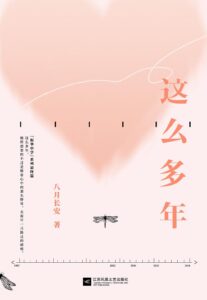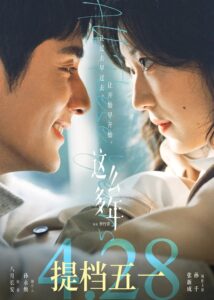All These Years
这么多年
China, 2023, colour, 2.35:1, 116 mins.
Director: Ji Zhuqing 季竹青.
Rating: 7/10.
A high school-to-adulthood unrequited love story that’s utterly generic but beautifully executed on all levels.
Harbin, Heilongjiang province, northeast China, 2019. After a long absence, Chen Jianxia (Sun Qian) arrives from Shanghai to visit her parents. Her mother Zheng Yuqing (Liu Dan) stills nags her endlessly, while her father (Tao Hai) just keeps quiet. As she goes through old things in her room, her memory goes back. (In 2005, after driving into the city from their small hometown in another county, Chen Jianxia’s mother and younger brother Chen Zhiwei [Wu Junting] had dropped her off at the prestigious Zhenhua Senior High, where she had won a place. She was a day late but managed to get a small room to herself, on the fourth floor of the girls’ dormintory. En route she had bumped into a male student, malingering rich kid Li Ran [Zhang Xincheng], who had later broken into her room while she was there. It was her first time away from home, in a county she didn’t know, and she had no friends. On a walk that night she had again bumped into Li Ran, in a CD shop; he was as pushy as ever but she’d finally taken a liking to him, as he gave her some self-confidence. Leter she had been picked on by class bully Yu Sisi [Sun Meilin], who had wrongly accused her of stealing her CD player. Upset, Chen Jianxia had run away and Li Ran had taken her to an exclusive, westerm restaurant to relax. At home her mother, who always preferred Chen Zhiwei, had still nagged her relentlessly. Subsequently Chen Jianxia had argued with Li Ran, whom she called privileged. A loner once more, she’d been befriended by the school beauty, Ling Xiangqian [Zhang Ruonan], who had invited her to a birthday party. There, Yu Sisi had tried to bully her again but Li Ran had stood up for her. Later, Li Ran had admitted his own family background was also not very loving, and he was actually closer to his grandfather [Li Guangfu]. He’d told Chen Jianxia that she must always be herself.) Chen Jianxia’s father goes to hospital for a checkup and on the way back home, after her mother complains they still don’t own a car, Chen Jianxia offers to buy one for her brother. In a car showroom she bumps into Li Ran. They immeditely start arguing, but later on meet and make up. (In 2006 Chen Jianxia and Li Ran had been going steady with each other. The following year her dormitory room had flooded, so Li Ran had paid for her to stay in a five-star hotel for the night. She had said her dream was to go to Nanjing University; he had said he had to take over his father’s business. By chance, Yu Sisi had seen them in the hotel’s foyer and taken pictures. Li Ran’s parents had complained to the school and, despite Chen Jianxia’s insistence that nothing had happened in the hotel, her mother had pulled her out of the school to save face. The family had moved back to their hometown and enrolled her in the local high school, where the other students all knew she came from the prestigious Zhenhua Senior High. Alone again, Chen Jianxia had been befriended by a talented male student, Wang Xiaoli [Ling Zhenghui]. Li Ran had paid her a visit and patched things up; afterwards, Chen Jianxia had stood up to her mother and said she wanted to transfer back to Zhenhua if she came top in the next round of exams. Chen Jianxia had succeeded in getting re-admitted to Zhenhua, where she had firmly put Yu Sisi in her place. In winter 2007, at the first mocks for the gaokao [university entrance] exam, Chen Jianxia had only done so-so. As her English was good, a teacher had recommended she accept an offer from the National University of Singapore – though the offer stipulated she had to work in Singapore for six years after graduating. Despite her mother’s opposition, Chen Jianxia had accepted the offer, though she still had to break the news to Li Ran.) Li Ran, who had taken over the family business when his father died, tells Chen Jianxia he’d heard she was busy running between Singapore and Shanghai in her career. When Chen Jianxia’s father is diagnosed with liver cancer, Li Ran arranges and pays for everything. But Chen Jianxia then learns that Li Ran is actually heavily in debt.
REVIEW
Utterly generic but beautifully executed on both an acting and a technical level, All These Years 这么多年 lovingly follows a 15-year-long friendship from high school to adulthood which is quite clearly an undeclared love affair from the start. This second feature by Ji Zhuqing 季竹青, a Shenyang-born writer-director in her mid-30s who studied film (and made a couple of shorts) in the US from 2007, is a big step up from her artier debut, Victim(s) 加害者,被害人 (2020), a Kuala Lumpur-shot drama centred on the murder of a high-school student supposedly by a classmate. Years is a full-on mainstream feature, funded by Mainland major Enlight Pictures and aimed at a Gen-90 audience, with a popular TV actor-singer (Zhang Xincheng 张新成) making his big-screen debut paired with a TV actress (Sun Qian 孙千) in her first lead film role. With the added draw of it being based on a novel by the much-filmed writer Bayue Chang’an 八月长安 (aka Liu Wanhui 刘婉荟, 35), it took a very solid RMB301 million this spring.
 The novel, published in 2021 (see left), is the last in a quartet by Bayue Chang’an (whose pen name literally means “Chang’an [ancient Xi’an] in August”) that features the fictional Zhenhua Senior High. Her previous three novels in the series spawned various film and TV versions, including the movies My Best Summer 最好的我们 (2019) and My Blue Summer 暗恋 橘生淮南 (2022), both of which tweaked the high-school formula and featured good performances, especially by their female casts. The basic plot of Years isn’t a million miles away from that of My Blue Summer, in which a successful young career woman reminisced about her long friendship/unrequited love with a rich kid who popped in and out of her life. And like that film the most notable thing about Years is its relaxed rhythm in which the relationship and characters are allowed to bloom.
The novel, published in 2021 (see left), is the last in a quartet by Bayue Chang’an (whose pen name literally means “Chang’an [ancient Xi’an] in August”) that features the fictional Zhenhua Senior High. Her previous three novels in the series spawned various film and TV versions, including the movies My Best Summer 最好的我们 (2019) and My Blue Summer 暗恋 橘生淮南 (2022), both of which tweaked the high-school formula and featured good performances, especially by their female casts. The basic plot of Years isn’t a million miles away from that of My Blue Summer, in which a successful young career woman reminisced about her long friendship/unrequited love with a rich kid who popped in and out of her life. And like that film the most notable thing about Years is its relaxed rhythm in which the relationship and characters are allowed to bloom.
After a brief intro to Chen Jianxia in 2019, the film flashes back 14 years to when she, as a teenager, is dropped off by her naggy mother and idle younger brother at the prestigious Zhenhua Senior High, at which she, a smalltown girl from an average family, has managed to get a place in the lead-up to the all-important gaokao (university entrance exam). She soon encounters the playful and pushy Li Ran, a rich kid who’s just going through the motions before entering his dad’s business. The story is basically how a friendship grows between these two social opposites – who both, actually, turn out to be from less-than-happy family backgrounds. Chen Jianxia is a studious loner who’s relentlessly put down at home by a mother who prefers her younger brother, while he is closer to his grandfather than his own parents.
The ending, though visible from miles, is moving in a corny way, thanks partly to director Ji’s overall packaging but also to the two leads who, rarely in youth films, have some geunuine on-screen chemistry. Zhang, 27, played the male lead in My Huckleberry Friends 你好旧时光 (2017), the online TVD of the second novel in the series, and here he shows an even easier charm as rich boy Li Ran that doesn’t overshadow the low-key but engaging performance of Sun, 26, as Chen Jianxia. Facially, the Harbin-born actress is a little reminiscent of South Korea’s Jeon Ji-hyeon 전지현 | 全智贤 (My Sassy Girl 엽기적인 그녀, 2001) but shows a broader range. As the girl’s odious mum, Harbin-born TV and stage actress Liu Dan 刘丹 (the naggy mother in What’s in the Darkness 黑处有什么, 2015; unflappable producer in The Pluto Moment 冥王星时刻, 2018; bitter sister in A Hustle Bustle New Year 没有过不去的年, 2021) is an unstoppable force of nature. As the noxious class bully, new name Sun Meilin 孙美林, 24, is potently cast.
The smooth score by Tang Hanxiao 唐汉霄 is well spotted, and several songs nudge the whole thing along. Though wholly unoriginal, the movie flows beautifully, with editing (Qiao Aiyu 乔爱宇), styling (Ye Zhuzhen 叶竹真), photography (Fan Chao 范超, Close to Love 我们的样子像极了爱情, 2022) and script (lead written by well-known novelist/scripter A Mei 阿美, So Long, My Son 地久天长, 2019, Sunny Sisters 阳光姐妹淘, 2021) all working together in harmony.
CREDITS
Presented by BJ Enlight Pictures (CN), Colorful Enlight (Yangzhou) Pictures (CN). Produced by BJ Enlight Pictures (CN), Colorful Enlight (Yangzhou) Pictures (CN).
Script: A Mei, Li Wei, Ji Zhuqing. Novel: Bayue Chang’an [Liu Wanhui]. Photography: Fan Chao. Editing: Qiao Aiyu. Music: Tang Hanxiao, Wang Yiren. Art direction: Liu Jing. Styling: Ye Zhuzhen. Sound: Lin Siyu, Du Duzhi, Du Zegang. Visual effects: Chen Kai, Ding Dawei.
Cast: Zhang Xincheng (Li Ran), Sun Qian (Chen Jianxia), Liu Dan (Zheng Yuqing, Chen Jianxia’s mother), Wu Junting (Chen Zhiwei, Chen Jianxia’s younger brother), Li Guangfu (Li Ran’s grandfather), Tao Hai (Chen Jianxia’s father), Zhang Ruonan (Ling Xiangqian, school beauty), Xu Fangzhou (Chu Tiankuo), Sun Meilin (Yu Sisi, class bully), Chen Zijin (Li Zhenping), Ling Zhenghui (Wang Xiaoli), Tang Yuan’er (Lu Linlin), Li Sisi (Yu Dan), Han Xiao (head teacher), Xi Tong (Li Ran’s stepmother), Jia Yinuo (aunt), Lv Dongmei (grandmother), Wang Qingwei (Daijia), Wu Yuxiao (Lang Yufei), Gao Huilin (Shu Jiatong), Qiao Hua (young girl), Xiu Yuxiu (air hostess).
Release: China, 28 Apr 2023.
